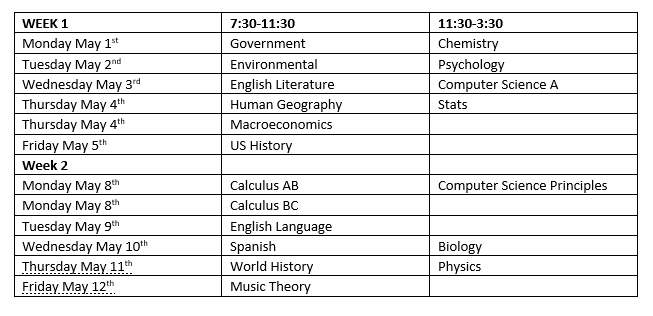AP Week is Here
Let’s put those pencils to the paper!
April 28, 2023
The AP testing period is starting on Monday, May 1, with AP Government and AP Chemistry taking up the first day.
Here is the full AP testing schedule:
Monday, May 1: AP Government (7:30-11:30) & AP Chemistry (11:30-3:30)
Tuesday, May 2: AP Environmental Science (7:30-11:30) & AP Psychology (11:30-3:30)
Wednesday, May 3: AP Lit (7:30-11:30) & AP Comp Sci A (11:30-3:30)
Thursday, May 4: AP Human Geography (7:30-11:30), AP Macroeconomics (7:30-11:30) & AP Statistics (11:30-3:30)
Friday, May 5: APUSH (7:30-11:30)
Monday, May 8: AP Calc AB & AP Calc BC (7:30-11:30) & AP Comp Sci Principles (11:30-3:30)
Tuesday, May 9: AP Lang (7:30-11:30)
Wednesday, May 10: AP Spanish (7:30-11:30) & AP Biology (11:30-3:30)
Thursday, May 11: AP World History (7:30-11:30) & AP Physics (11:30-3:30)
Friday, May 12: AP Music Theory (7:30-11:30)
As AP tests loom, students all around the country are preparing at the same time, and probably stressing too. It’s important to know the contents of the tests and what to expect when you sit and start writing. You need to know the materials you have available and use them to your advantage.
Let’s go back to my focus of AP World History, testing on Thursday, May 11. Section 1 lasts for 95 minutes and consists of 55 multiple-choice questions and 3 short answer questions. The multiple-choice questions are primarily stimulus based, last 55 minutes, and are worth 40% of your final score. The short answer questions last 40 minutes and you need to answer 3 of them. It is worth 20% of your final score.
For Section 2, it lasts 100 minutes and consists of 1 document based question and 1 long essay question. For the DBQ, it lasts 60 minutes with a 15-minute reading period. Students are given 7 documents to analyze and formulate a thesis and write an essay. It is worth 25% of your final score. The LEQ is 40 minutes and is worth 15% of your grade.
It’s also important to notice the mental changes that occur when the AP cram begins. Mrs. Christin Orth, an AP Lang teacher and a 10th grade English teacher, says that the weeks leading up to the test present “an undercurrent of tension, especially in students that didn’t realize they had to practice and start cramming. There’s definitely a collective sigh of relief when the test is over that I notice.” Even in her 10th grade students, the AP World test brings out a state of panic.
Review modules are available on Canvas, and many online resources can help you narrow down your study topics. It’s time to study and prepare, so do not hesitate! Ask your teachers for help, and don’t be afraid to ask your older friends how they fared.


